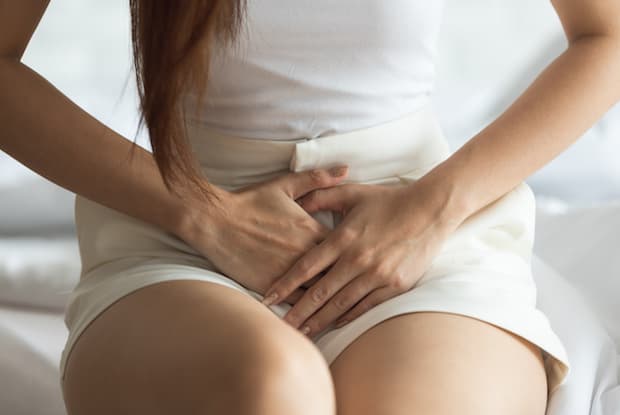Table of Contents
I. Understanding Menopause and Estrogen
Understanding Menopause and Estrogen
Menopause comes with many changes for most women. Women typically go through menopause between 45 and 55 years of age. Some women may go through menopause earlier due to other external factors like surgeries, chemotherapy, and low estrogen. Estrogen is the primary female hormone responsible for many of the functions of the female sex organs.
When a woman reaches menopause, estrogen levels can dip dramatically. A woman reaches full menopause when she has not had a menstrual period for 12 months in a row, but hormone levels can fluctuate before this time. In the time before full menopause (perimenopause), there will be intermittent decreases in estrogen, progesterone, and testosterone. [1]

Estrogen functions include:
- Thickening of the uterus during menstruation
- Preserving bone
- Vaginal blood flow and lubrication
- Stimulating the growth of breast tissue
- Keeping the vaginal lining elastic
Progesterone functions include:
- Lining the uterus for a fertilized egg
- Keeping the uterus healthy during early pregnancy
- Testosterone functions include:
- Maintaining bone and muscle mass
- Contributing to libido
- Helping with estrogen production [2]
Once menopause occurs, several unpleasant symptoms may follow. Fluctuating hormones can wreak havoc on the body for some women. Doctors may prescribe Premarin, Combipatch, or Provera to help women regulate estrogen hormones and prevent side effects. Read on to learn more about the effects of menopause on the female body.
Menstrual Changes
From puberty to menopause, women typically have one menstrual period a month. Menstruation is the discharge of blood and tissue from the uterus. The menstrual cycle helps a female body prepare for pregnancy every month. During a menstrual cycle, hormones mature an egg from the ovaries. The uterine lining then becomes spongier and thicker than normal to accommodate this new potential fertilized egg. If the egg does not get fertilized by a sperm cell in the span of a menstrual cycle, then the uterine lining is shed, and a period occurs.
Estrogen is responsible for the functioning of the female reproductive system, and when estrogen levels dip, menstruation is affected. Women typically notice changes in their period in middle age and may stop getting it altogether between 45 and 55 years old. Once menopause has taken hold, a woman is no longer able to get pregnant. [3]
Bladder Changes
A drop in estrogen hormones can also affect the functioning of the bladder and urethra. Women are more likely to experience overactive bladder (OAB) when they reach menopause. Estrogen helps the pelvic and bladder tissues stay flexible, but menopause can cause these tissues to weaken and lead to muscular pressure around the urethra.
These bladder changes can increase the chance of getting urinary tract infections and OAB. One study of 351 menopausal women in China found that 7.4 percent of them had overactive bladder symptoms. Pelvic exercises like Kegels and prescription medications like Provera can improve these symptoms. [4] Hot flashes are a result of endocrine system changes caused by menopause. The endocrine system is responsible for hormone production. When the endocrine system stops producing progesterone and estrogen during menopause, hot flashes occur. Many women have hot flashes before, during, and after menopause. Hot flashes can last for several years after menopause. Hot flashes are feelings of sudden heat and can cause flushed skin and sweating. Hot flashes may also cause night sweats when you try to sleep at night. Hot flashes can come on suddenly and affect your everyday activities. Some women have to avoid caffeine and hot beverages to limit their chance of having a hot flash. Prescription medications, as well as mindfulness techniques, can limit hot flashes. Changes in the endocrine system can also make the body reserve more energy, leading to weight gain. [5] Many women complain about their quality of sleep during menopause. If you experience hot flashes, they can wake you up in the middle of the night and make it difficult to get a good night’s sleep. They can last for several minutes, which can lead to poor sleep quality. Insomnia, mood disorders, and disordered breathing are the effects of menopause. The Sleep Foundation reports that 61 percent of menopausal women report insomnia symptoms. Menopausal women are also more prone to snoring. When snoring leads to pauses or gasps in breathing, you may have obstructive sleep apnea. This can be dangerous if left untreated, and you may need a continuous positive airway pressure (CPAP) machine. This machine makes sure that your airway does not collapse when you breathe in. [6] Less estrogen in the body can lead to vaginal dryness or vaginal atrophy. This makes the vaginal tissues thinner and easily irritated. This can severely affect women’s sex life and make intercourse painful. Luckily, there are several over-the-counter lubricants you can buy to help with vaginal dryness. Taking prescription estrogen replacements can also increase vaginal lubrication. Along with vaginal dryness, a lack of libido can also occur. A lack of estrogen can lead to a low sex drive. This change in sexual activity may be worsened if sex is painful due to vaginal dryness. These symptoms are not always permanent but talk to your doctor if they become a significant problem in your relationship.[5] Several skeletal and muscular changes occur when a woman reaches menopause. Estrogen plays an integral role in bone health, and when estrogen dips, a woman’s bone health may be at risk. Osteoporosis causes the bones to become more porous, which lowers bone density and increases the risk of fractures. Menopausal women are encouraged to take vitamin C and keep an eye on their bone health. Menopausal women also lose more muscle mass. The joints may also become stiff and achy. It is advised to tell your doctor if you feel more stiff than usual or suffer from a small fracture. Maintaining a healthy exercise routine can help prevent loss of muscle and bone density. Your doctor will let you know the right treatment options for you. [5] The content in this article is intended for informational purposes only. This website does not provide medical advice. In all circumstances, you should always seek the advice of your physician and/or other qualified health professionals(s) for drug, medical condition, or treatment advice. The content provided on this website is not a substitute for professional medical advice, diagnosis or treatment.
Hot Flashes
Sleep Problems
Vaginal Dryness

Osteoporosis
